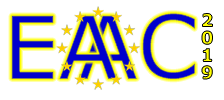Speaker
Description
The Horizon2020-funded project EuPRAXIA is a conceptual design study aiming to develop a multi-GeV electron accelerator test facility based on plasma acceleration. With particular emphasis on compactness and cost-effectiveness, the project focuses on achieving high beam quality, stability and robustness, unprecedented for plasma accelerators and essential for their development towards user readiness. While the entire project will be summarised in a conceptual design report in October 2019, one particular topic of importance is the science case of EuPRAXIA. Several highlight user applications are foreseen for the baseline design of the machine, including, among others, free-electron laser pilot experiments, radiation- and positron-beam-based imaging for materials and life sciences as well as high-energy physics detector testing and accelerator R&D. This paper will highlight some of these applications and more generally potential future uses of plasma accelerators. We will also discuss the layout of the facility and touch on the role of EuPRAXIA within the current and future research infrastructure landscape in Europe.

